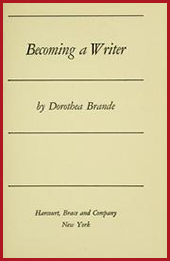 This is the sixth in my reread series of Dorothea Brande’s Becoming A Writer – seminal 1934 book that helped for the bedrock of a lot of modern writing advice.
This is the sixth in my reread series of Dorothea Brande’s Becoming A Writer – seminal 1934 book that helped for the bedrock of a lot of modern writing advice.
You can find the first post here.
This chapter leads directly on from Chapter 5 in that both Chapters 5 and 6 cover exercises to help a person write more freely and effortlessly. In Chapter 5, the aim was to help connect up the unconscious with the writing process. In Chapter 6, the drive is more towards being able to write anywhere, anytime.
It is a common and good bit of advice often given by authors to not let yourself think that you can only write in a particular room, at a particular time of day, with a particular album playing or with a particular arrangement of 80’s toys arrayed on your desk (to just pick some random examples).
This chapter aims to cure this self-imposed crutch, or prevent it from forming in the first place.
The exercise is elegant in its simplicity:
- Each morning, over breakfast perhaps but before you leave the house, sit down and think about your day.
- Think on paper if you need to. This is often good advice regardless of any desire to write – just thinking through what you need to do during a day can make a big difference to getting things done
- Then, pick a time to write that you know will be free. Pick an amount of time, maybe starting with 15 mins if you are unsure that you really can find the time. Almost anyone can find 15 mins in a day if really determined.
- Now, the important thing is, when that time rolls around you stop whatever you are doing, make whatever excuses are needed and go and do the writing.
- You need to treat this as an absolute sacred duty. You must write at this time. It doesn’t matter how good the writing is. You just need to do it.
- As the days go on, keep repeating this but try to vary the time of the day and how long you write. You’ll eventually find a time and duration that suit you. Also, you’ll have trained yourself into being able to write anywhere, anytime.
Dorothea actually follows this with what she writes is the only piece of really gloomy and serious advice in the book:
If you fail repeatedly at this exercise, give up writing. Your resistance is actually greater than your desire to write, and you might as well find some other outlet for energy early as late.
Now, I need to follow this with a confession, which is that although I could see the value in this exercise I failed utterly at it when I tried it. At the time I was finishing up a PhD, there was no limit to the amount of work I was supposed to be doing, and I was writing extensively as part of the PhD thesis writing process.
Perhaps I didn’t take it as seriously as I could have. Long before this I had already proved to myself that I could work on a novel every day (the novel in question wasn’t very good, but I did work on it every day for six months).
At the moment I have a write every day policy too. It doesn’t matter if it is only a sentence snatched at the end of the day before going to bed. I have to open my current project, read a paragraph or two and add to it. Sometimes I only manage a sentence and fall into bed. Sometimes I intend to only write a sentence and several pages later I realise that it’s now well past midnight and I really need to go to bed.
At any rate, I didn’t feel too disheartened about failing to do this exercise, and I think perhaps Dorothea’s advice might be a bit overstated. If you find you can’t do the exercise, try setting a time each day to write and doing that, or a time each week if baby steps will help you start off. You do need to be able to write every day if you want to be a professional writer of words, but there may well be more than one path to get there.
This rounds off what is a relatively short chapter. The next chapter is The First Survey, and this is when we’ll look back on those pages of early morning writing you’ve been doing from Chapter Five.

